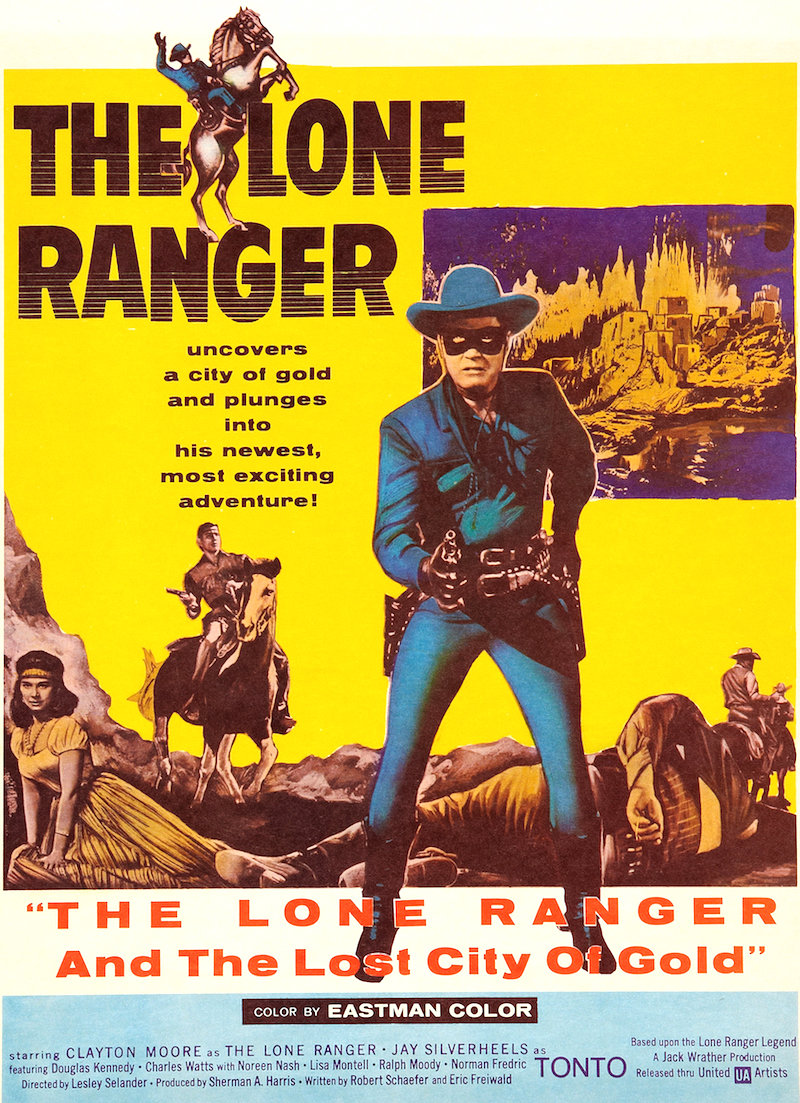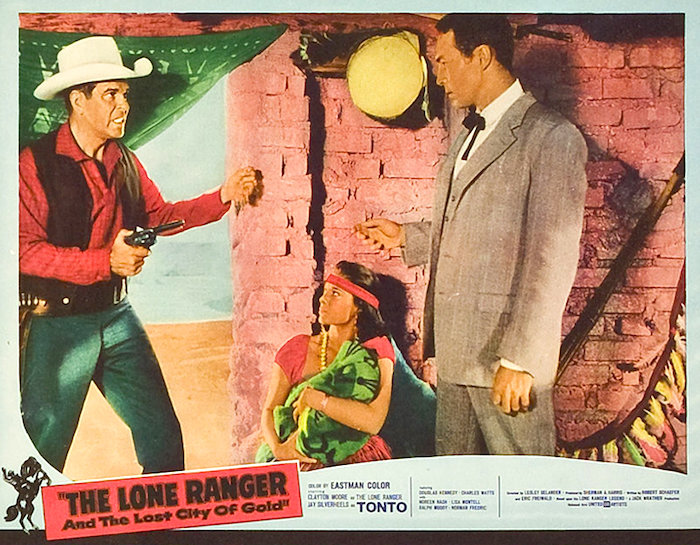
Directed by Lesley Selander
Produced by Jack Jungmeyer
Screenplay by Maurice Geraghty
Story by Frank Gruber
Music by Dimitri Tiomkin
Cinematography: Jack Greenhalgh
Film Editor: Francis D. Lyon
Cast: George Montgomery (Tom Horn / Steve Garrett), Rod Cameron (Harve Logan / Kid Curry), Marie Windsor (Dakota Lil), John Emery (Vincent), Wallace Ford (Carter), Jack Lambert (Dummy), Larry Johns (Sheriff), Marion Martin (Blonde Singer), James Flavin (Secret Service Chief), Walter Sande (Butch Cassidy)
 This is an entry in The Marie Windsor Blogathon, a celebration of the actress’s life and work. It comes from guest blogger Boyd Cathey.
This is an entry in The Marie Windsor Blogathon, a celebration of the actress’s life and work. It comes from guest blogger Boyd Cathey.
Marie Windsor always evokes wonderful memories for me, and on this day, December 11, 2020, which would have been her 101st birthday, I think back to the films with her that left an imprint on me, and that since my childhood I’ve managed to see and in many cases finally acquire.
When I was young boy my dad and I would go from time to time to a movie house in downtown Raleigh, North Carolina, usually on a Saturday, to see a Western double feature. Our favorite was Randolph Scott. My dad’s family is from Charlotte, and my grandparents were acquaintances with Randy Scott’s family, also in Charlotte, so we had a connection. One of the first films I recall featuring Marie Windsor was The Bounty Hunter (1954). I think it was a re-release at one of the lesser, second-run theaters that used to exist in the city, as the original release was in 1954, and I was too young to go to movies back then. I remember her role as the wife of a notorious bandit—she wasn’t the main star, but she seemed to give an extra spark to this Scott Western, which like most of his Warner oaters seemed less polished than the Columbia products.

Anyway, I was taken by her. Okay, I was maybe only about 10, but I was captivated—she was beautiful and perky, and along with Sophia Loren, she became my idolized female star. In the late 1950s until her retirement in 1991, she also frequently acted in television. She made appearances in Maverick, Rawhide, Perry Mason, even Murder, She Wrote with Angela Lansbury, one of the best American crime mystery series. And Windsor was always beautiful and captivating, she never seemed to age.
A few years later—probably the early 1960s or so—a local television station broadcast Dakota Lil (1950), one of those films that stations would broadcast usually late at night. I begged my parents to let me stay up—it was a school night, and my normal bedtime was 10 p.m. Somehow they agreed, maybe because dad wanted to see it also. Anyway, we both viewed it, and immediately Dakota Lil became a favorite.

The plot is fairly simple, although the development is more complicated. George Montgomery, Secret Service undercover agent Tom Horn (as Steve Garrett), is charged with breaking a major counterfeit outfit, the “Hole-in-the-Wall” gang in Wyoming. To do this he travels to Matamoros, Mexico, to enlist the aid of Windsor—Dakota Lil—noted for her ability to perfect an exact replication of official signatures. They both head to Wyoming, but she initially begins working with the chief culprit and the particularly nasty Rod Cameron (Harve Logan/Kid Curry)
The first thing you notice is the film score: it’s by the award-winning composer Dmitri Tiomkin, and it is gorgeous and memorable. In fact, its themes remained in my mind long after I first watched the DVD. Certainly, Fox by charging Tiomkin with the music of Dakota Lil intended it to be more than just another “super-B” Western. Additionally, John Emery, who plays the role of Vincent, a former concert pianist and hanger-on to Windsor, offers up several short pieces by Frederic Chopin! Marie—Dakota Lil—sings various songs, with the singing voice of Anita Ellis. She executes excellent lip-syncing.

Although Dakota Lil showcases a youngish George Montgomery, Windsor steals the show and adds essential sparkle to the film. She invests the generally unremarkable dialogue with some real panache, indeed with just a face gesture or an inflection in her voice she can steal a scene. When she shows up at the Wind River, Wyoming, saloon (owned by Cameron) and comes upon the current diva, that chanteuse asks her: “What are you staring at?,” Windsor responds dryly: “A no talent performance.” Likewise, her dialogue with Cameron on how they plan to split the proceeds of the counterfeit government bonds shows comparable spunk and her mastery of crisp exchange, even humor. One can see how Marie Windsor fit so well into film noir, indeed, Dakota Lil shares certain characteristics of that genre. Consider, for example, Cameron’s preferred method of killing his enemies—by brutal strangling, almost matter-of-fact in its cruelty.
It was only in 2015 that I discovered that a DVD existed, in fact, two DVD releases. And I snatched up a copy as soon as I could. Both are in the PAL European video format, which means they will not play in American NTSC DVD players; but All Region DVD players are easily available and can be had inexpensively via Amazon.com and elsewhere. One copy was issued in Spain, which I have not seen. My copy is issued by Simply Media, a British company, which licensed their copy from Renown Films.

Although Dakota Lil was originally released by 20th Century-Fox in Cinecolor (February 1950), to my knowledge no color issue has emerged since its original release. Neither of the available DVDs is in color. Since Cinecolor was a less stable and reliable color process than Technicolor, one wonders if such a copy still exists somewhere in the Fox archives. Kino Lorber has done some wonderful restoration work with Scott’s The Cariboo Trail and Canadian Pacific, both Fox releases, so maybe we are allowed to hope?
Both the Simply Media copy and the Spanish release are available reasonably from the American firm, DaaVeeDee.com and also from Amazon.com. My copy is a good B & W issue, with a sharp picture and no sign of deterioration.
Directed by warhorse director Lesley Selander, Dakota Lil is surely one of his finer efforts. It deserves to be much better known. No, it’s not perhaps as good a vehicle for Windsor as, say, Hellfire (1949, with Wild Bill Elliott), but it merits attention…and perhaps a full digital restoration?
In any event, it should be seen for Marie Windsor’s fine performance which raises this film above the dozens similar to it released in 1950. Happy Birthday, Marie, and may your legacy on film continue to be enjoyed and appreciated!
Read Full Post »























 This picture was clearly meant for kids. But there’s something about The Lone Ranger and Tonto I find more appealing the older I get. Their friendship, their fairness and their ongoing fight for justice are things we all could use some extra exposure to. I love this movie.
This picture was clearly meant for kids. But there’s something about The Lone Ranger and Tonto I find more appealing the older I get. Their friendship, their fairness and their ongoing fight for justice are things we all could use some extra exposure to. I love this movie.





